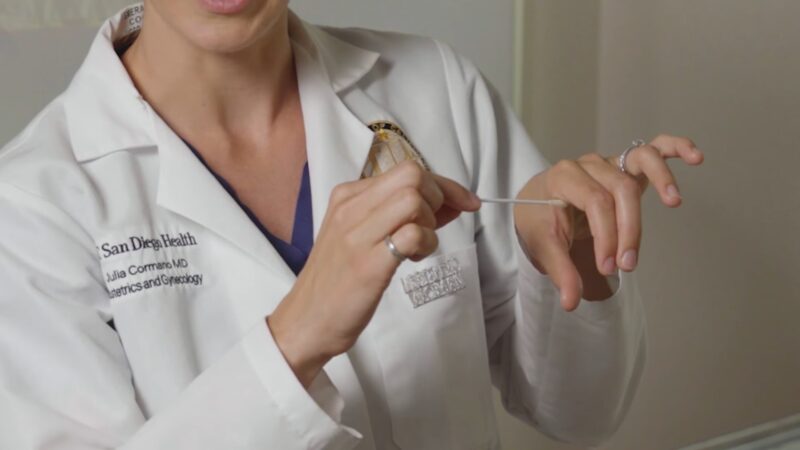Pregnancy is a time of joy, anticipation, and preparation. As parents-to-be eagerly await the arrival of their little ones, they also undergo various medical tests to ensure the health and safety of both the mother and the baby.
One such crucial test is for Group B Streptococcus (GBS). In this comprehensive guide, we will get into the reasons behind testing for GBS during pregnancy, its implications, and the steps that can be taken if a woman tests positive.
Group B Strep, commonly known as GBS, is a type of bacteria that resides in the human body. While it’s generally harmless to adults, it can pose severe risks to newborns if transmitted during childbirth.
What is Group B Strep?
Group B Strep is a bacteria that many individuals carry in their intestines. For women, it can also be found in the vagina and rectum.
Interestingly, about 25% of women have GBS in these areas. It’s essential to understand that GBS is a natural part of the body’s flora and doesn’t pose any immediate threat to the carrier.
Moreover, it’s not a sexually transmitted disease.
- Normal Flora: GBS is considered a normal flora of the body. This means it naturally exists in our system without causing harm.
- Not Harmful to Women: While GBS resides in a woman’s body, it doesn’t pose any direct threat or cause symptoms.
Risks to Newborns
The real concern with GBS arises when a pregnant woman passes it to her baby during labor. This transmission can lead to severe health complications for the newborn.
- Early-onset: This occurs within 24 hours of birth and can lead to breathing issues, kidney problems, and heart and blood pressure complications. Conditions like sepsis, pneumonia, or meningitis can also develop.
- Late-onset: Symptoms appear weeks or even months after birth. Meningitis is a common condition associated with late-onset GBS.
It’s alarming to note that GBS can be fatal, leading to the death of 5% of affected babies. Survivors might face long-term health challenges, including disabilities, vision loss, and cerebral palsy.
Testing For
As the risks associated with GBS are significant, it’s crucial for pregnant women to get tested. This simple test can be the difference between a healthy baby and severe complications.
How is the Test Conducted?
The process to test for GBS is straightforward. A healthcare professional will take a swab from the pregnant woman’s vagina and rectum. This procedure is painless and quick.
- Swab Test: A Q-tip is used to collect samples from the vagina and rectum.
- Lab Analysis: The collected sample is then sent to a lab where it’s cultured to detect the presence of GBS.
Interpreting the Results
A positive result indicates that the woman is a carrier of GBS. However, it’s crucial to note that being a carrier doesn’t guarantee transmission to the baby during labor. In fact, only 1 in 200 GBS carriers transmit the bacteria to their newborns.
- Antibiotic Treatment: If a woman tests positive for GBS and exhibits certain risk factors, she might be given antibiotics during labor. This reduces the chances of GBS transmission to the baby.
- Risk Factors: These include having a fever during pregnancy, water breaking more than 18 hours before labor, or experiencing preterm labor.
Managing a Positive Result

Discovering that you’re a carrier can be concerning. However, with the right information and medical guidance, you can make informed decisions for the well-being of your baby.
Antibiotic Administration
Antibiotics are the primary line of defense against GBS transmission during labor. They are administered when a woman’s water breaks or when she starts labor.
- Effectiveness: Treating before labor isn’t effective as the bacteria can repopulate quickly.
- Penicillin: This antibiotic is commonly prescribed to combat GBS. It’s safe for the baby and effectively kills the bacteria.
Making an Informed Decision
If a woman tests positive for GBS but doesn’t exhibit any risk factors, the decision to take antibiotics during labor rests with her. It’s essential to have a thorough discussion with the healthcare provider to understand the benefits and potential risks.
- Allergy Concerns: If there’s uncertainty about a penicillin allergy, a skin test can be conducted.
- Risk vs. Reward: While antibiotics can prevent GBS transmission, it’s crucial to weigh the benefits against potential side effects.
The Importance of Awareness

In the realm of prenatal care, knowledge is power. Being informed about Group B Strep and its potential implications can make a significant difference in the health outcomes for both mother and child.
Why Awareness Matters
Awareness about it is not just about knowing what it is but understanding its implications, risks, and the steps to manage it. This knowledge can empower pregnant women to make informed decisions about their health and the health of their unborn child.
- Early Detection: Being aware means getting tested on time, which can lead to early detection and management.
- Prevention: Knowing about GBS can help in taking preventive measures, reducing the risk of transmission to the baby.
Spreading the Word
While medical professionals are well-versed and its implications, the general public might not be. It’s crucial for those who know to spread the word, ensuring that more women are informed and can take the necessary precautions.
- Community Engagement: Hosting awareness sessions or workshops in communities can be beneficial.
- Online Platforms: Utilizing social media and blogs to share information about GBS can reach a wider audience.
Understanding the Broader Implications+

While it primarily affects newborns, its impact can be felt more broadly, affecting families and communities at large.
The Emotional Toll
A diagnosis, especially if it leads to complications in the newborn, can take an emotional toll on parents. The fear, anxiety, and stress associated with potential health risks to their baby can be overwhelming.
- Support Systems: It’s essential for families to have a strong support system, including counseling if needed, to navigate these challenging times.
- Community Understanding: A well-informed community can offer support and understanding, reducing the stigma or misconceptions associated with GBS.
Economic Implications
Managing, especially if it leads to complications, can have economic implications. Hospital stays, treatments, and long-term care for affected babies can lead to significant medical bills.
- Insurance: Ensuring adequate health insurance can mitigate some of these costs.
- Government Support: Some regions might offer financial support or subsidies for families dealing with GBS-related complications.
Future Research and Development
The medical community continually strives to better understand Group B Strep and find more effective ways to manage and prevent it.
Ongoing Research
- Vaccine Development: There’s hope in the medical community that a vaccine against GBS might be developed in the future, offering another layer of protection for newborns.
- Improved Testing: As technology advances, we might see even more accurate and faster testing methods for GBS.
Global Collaborations
- Shared Knowledge: Collaborative research can lead to faster discoveries and better solutions.
- Unified Protocols: A global approach can lead to standardized testing and treatment protocols, ensuring that women worldwide receive the best care possible.
FAQs
1. Can it affect the mother’s health during pregnancy?
While GBS is generally harmless to the mother and is not known to cause pregnancy complications, there can be rare instances where the mother might develop a urinary tract infection (UTI) due to GBS. It’s essential to consult with a healthcare provider if any symptoms arise.
2. Can I prevent getting during pregnancy?
GBS is a natural flora in many women, and there’s no surefire way to prevent it. However, maintaining good hygiene can reduce the risk of introducing or spreading bacteria.
3. How often should I get tested for GBS?
Typically, pregnant women are tested for GBS between weeks 35-37 of their pregnancy. If you’ve had a baby with GBS disease or had GBS in your urine during this pregnancy, you won’t need to be retested—your healthcare provider will recommend antibiotics during labor.
4. Are there any side effects to the antibiotics given for?
Most women and their babies do not have any side effects from the antibiotics. However, there’s a small chance of allergic reactions. It’s crucial to inform your healthcare provider if you have any known allergies.
5. Can I have a home birth if I test positive for it?
It’s possible, but you should discuss this with your healthcare provider. They will guide you on the precautions and necessary arrangements to ensure the safety of both you and your baby.
6. If I tested positive for in a previous pregnancy, will I have it again?
There’s a good chance you might test positive again, but it’s not guaranteed. It’s always recommended to get tested in each pregnancy.
7. Can it be treated before labor starts?
Treating GBS before labor or water breaking is not recommended because the bacteria can grow back quickly. The most effective time to administer antibiotics is during labor.
Final Words
Group B Strep, while common, carries significant implications for newborns. As expecting parents, it’s essential to arm ourselves with knowledge, ensuring that we take every step possible for the health and safety of our babies. With the right information, timely testing, and medical guidance, we can navigate this aspect of pregnancy with confidence and peace of mind.
